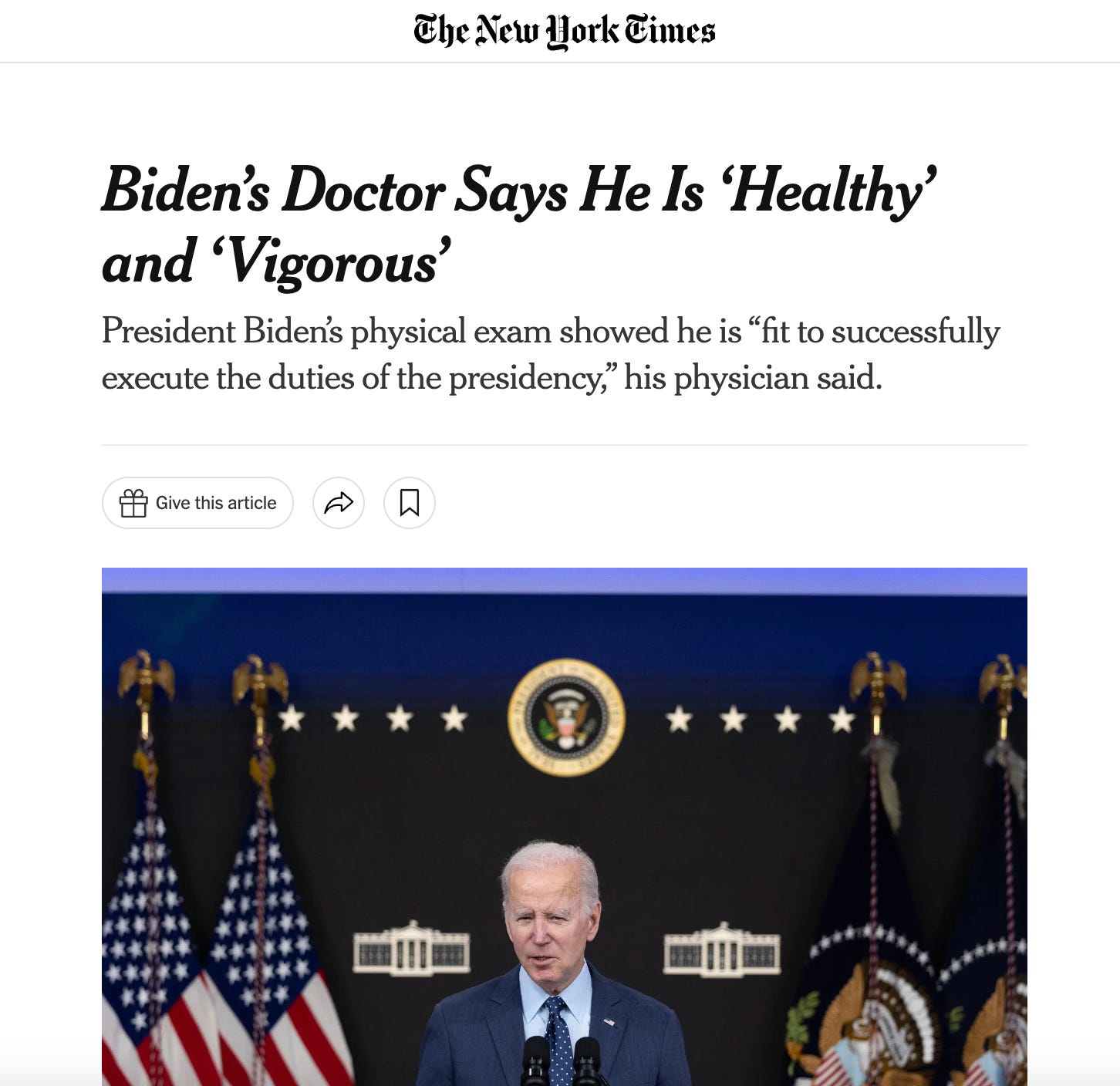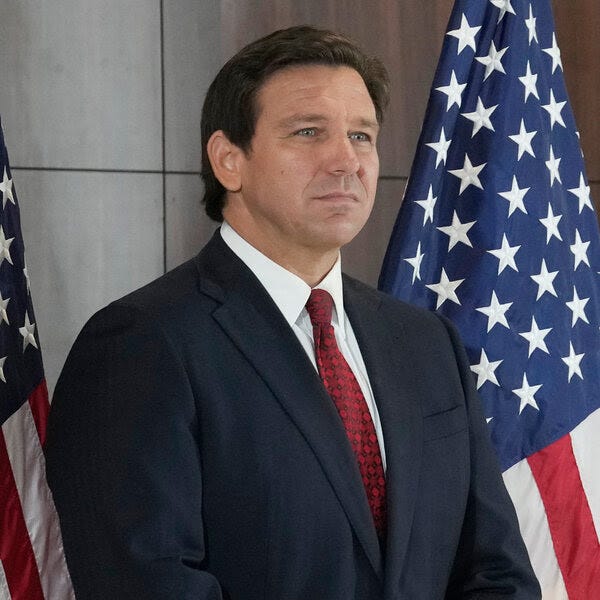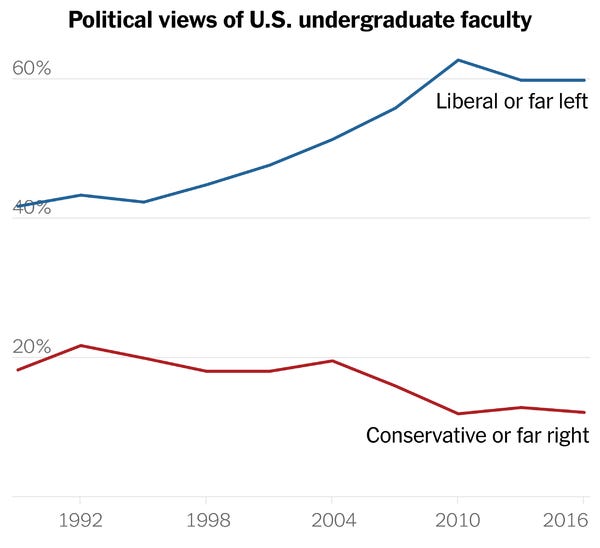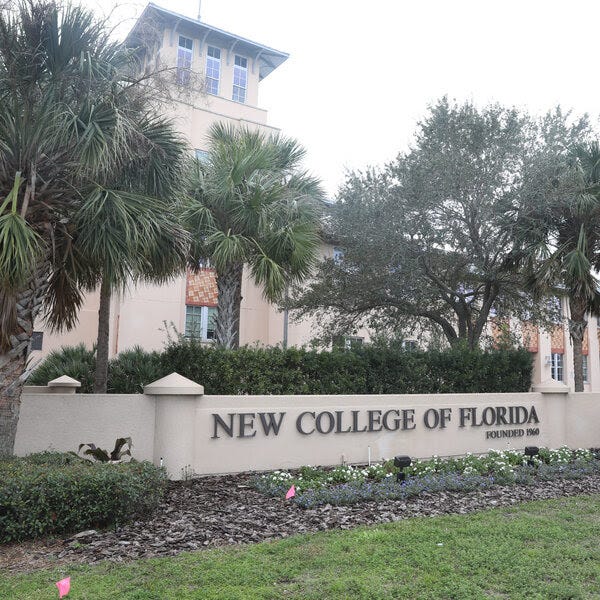Conservative Education
Today the NYT covers the uphill battle for conservatives changing higher education
Welcome to Unbiased NYT. Every day we annotate The Morning, a free newsletter from the NYT to provide context and point out ways they manipulate every day readers with biased writing and opinions that they present as facts.
Today, the NYT newsletter covers how conservatives, led by Ron DeSantis in Florida are working to change higher education to reduce liberal bias.
The reporting was overall fair and unbiased. The reporter offered a cool and collected take outlining that yes - there is a liberal bias in higher education. The reporter went into detail comparing the differences between the challenges of bringing conservative views into the mainstream media vs. education. With media, Fox News was able to carve out their own lane and audience to create an opposing view to liberal-leaning media like CNN and CNBC. But with higher education, conservative views would need to be implemented into existing institutions to create real change, just creating new institutions will not be enough to see similar success.
In other news, no matter where you fall on the political spectrum the NYT reporting of Biden’s doctor saying he’s ‘healthy’ and ‘vigorous’ would probably prompt an eye roll. These are not two words most Americans would use to describe President Biden as only 28% of respondents to an NBC News poll said that he possesses “the necessary mental and physical health to be president” - 54% said that they believe he does not.
/end
NYT: The Morning Newsletter is below for context
Good morning. Conservatives are trying to do to higher education what they did to the news media and think tanks.
Ron DeSantis, Florida’s governor.Marta Lavandier/Associated Press
Liberal education
Conservatives denounced left-wing bias among the news media and elite thinkers for decades before acting to alter the landscape. By founding Fox News and think tanks like the Heritage Foundation and the Cato Institute, they expanded the reach of conservative voices in America — and counterbalanced what was once a liberal tilt.
Now, some conservatives are following a similar playbook to change higher education. Hillsdale College, the small, conservative Christian school in southern Michigan, has expanded its Washington, D.C., campus to try to reach more students. Conservatives have also claimed victories over more established institutions: After the College Board altered its Advanced Placement course in African American studies this month, Florida Gov. Ron DeSantis suggested his administration had driven the changes.
But DeSantis has aimed broader than the College Board. He recently announced proposals to transform Florida’s public universities. He has called for an end to diversity programs and for weaker tenure protections for professors. And he installed conservatives as leaders of New College of Florida, a small public school in Sarasota.
“The new leadership has said explicitly that they want to change the ideology of the school,” said my colleague Patricia Mazzei, The Times’s Miami bureau chief. “It’s become a test case.”
Today’s newsletter will look at what DeSantis is doing — and why he may have a hard time succeeding.
Real bias
Higher education faculty is predominantly liberal. On this point, there is not much debate among experts. About 60 percent of undergraduate teaching faculty identify as liberal or far left, compared with about 12 percent who identify as conservative or far right. The gap has grown over the past few decades.
Source: Higher Education Research Institute Faculty Surveys, U.C.L.A.
Why does it exist? There is less agreement on that question. It could be a self-fulfilling prophecy: Because colleges are viewed as liberal institutions, fewer conservatives strive to join their staff. Or it could be that faculty hiring boards discriminate against conservative applicants. And since college graduates are more likely to identify as liberal, the pipeline for conservative professors is narrower.
What is the impact? Surprisingly, some studies suggest that college classes may actually moderate students’ views. As liberal as they may be, professors generally encourage students to engage with different, and sometimes conservative, viewpoints. “There’s a tendency for movement conservatives to overstate the problem,” said Jon Shields, a conservative and a professor of government at Claremont McKenna College.
Still, professors’ left-wing bias most likely leads to some self-censorship by students and faculty and limits political discussions on campuses. A lack of interaction with conservative mentors could also push students to fill the void with more extreme right-wing sources, Shields said.
There is a harm to progressive students too, said Amy Binder, a sociologist at the University of California, San Diego. In her research, conservative students told her that they were constantly challenged by liberal teachers and students, helping them sharpen their abilities to think about opposing ideas and debate them. Progressive students generally get less of that experience.
The public appears to agree that this is a problem: A majority have said that campus politics lean toward one direction and that there’s too much concern about protecting students from views they might find offensive, a 2019 Pew Research Center poll found.
So DeSantis is rallying not only his core supporters with this issue but potentially swing voters as well.
Sarasota, Fla.Octavio Jones for The New York Times
Difficult challenge
DeSantis nonetheless may struggle to accomplish his goal of transforming higher education. It is a sprawling sector where many people with power — namely, professors — have tenure and cannot easily be replaced.
The dynamics are different with higher education than in the news media. Conservatives did not have to take over CNN or MSNBC to alter the balance of coverage; they simply created Fox News and built an audience there. But a single conservative university can serve only so many students. Conservatives need to change the culture of perhaps thousands of campuses without scaring away students and their parents — an onerous task.
DeSantis is pursuing two paths. He is taking steps to change major tenets of higher education. His proposal to weaken tenure, which the legislature must approve, could make it easier for his appointees to fire liberal teachers. But those professors would have to be replaced. There may not be enough conservatives for all of those jobs, especially as the pool of potential hires — college graduates — has shifted further left over time.
The second part of DeSantis’s push is narrower: transforming New College of Florida, which has nearly 700 students. Its new leadership hopes to turn the school into a model for a conservative education by, for example, developing a new core curriculum. But scaling that model statewide or nationally would be a much bigger undertaking.
Of course, even if DeSantis fails to overhaul higher education, his efforts could have another benefit for him: They could give his expected presidential campaign a boost in Republican primaries that are likely to get very contentious.
Related: If DeSantis runs, he would start the campaign in an unusually strong position for someone who has never held national office — similar to Barack Obama in 2008, Ronald Reagan in 1976 and Ted Kennedy in 1980, as Nate Cohn explains.
THE LATEST NEWS
Politics
A Georgia grand jury said “one or more” witnesses may have committed perjury during its investigation into whether Donald Trump and his allies interfered in the 2020 election.
“Crazy stuff”: Some Fox News stars privately expressed disbelief about Trump’s false election claims as the network continued to promote the lies.
Senator John Fetterman, a Pennsylvania Democrat, checked himself into a hospital seeking treatment for clinical depression.
“I make no apologies for taking down that balloon,” President Biden said in his first formal address on the recent shooting down of flying objects.
Biden remains a “healthy, vigorous 80-year-old,” his doctor said.
Both sides of the abortion debate agree on at least one thing: Doctors are the critical link — and that has made them vulnerable to punishment.
Tech
Microsoft’s chatbot professed its love for Kevin Roose, a Times tech columnist.
Microsoft is considering guardrails for its A.I. chatbot after users reported creepy conversations. Hear about the weird exchanges on The Times’s tech podcast.
Chatbots use informed guesses to write sentences. See how they work — and learn how to spot their writing.
Never forget: Chatbots are not sentient, Vice writes.
Tesla is recalling more than 362,000 cars after regulators found that its “Full Self Driving” system increased the risk of accidents.
Susan Wojcicki, YouTube’s chief executive and a prominent female leader in Silicon Valley, is stepping down.
Other Big Stories
Residents of East Palestine, Ohio, expressed skepticism that federal aid will clean their air and water after a train derailment caused a toxic chemical spill.
Influencers online are publishing wild speculation about the impacts of the spill.
Western leaders are showing support for Ukraine at a conference in Munich ahead of the war’s one-year anniversary.
Bullet-resistant desks and anti-shooter training: Protecting children from mass murder has become a $3 billion industry.
Some American families are delaying medical care over cost concerns.
The Chinese government has pushed businesses to serve its military interests, including developing spy balloons.








